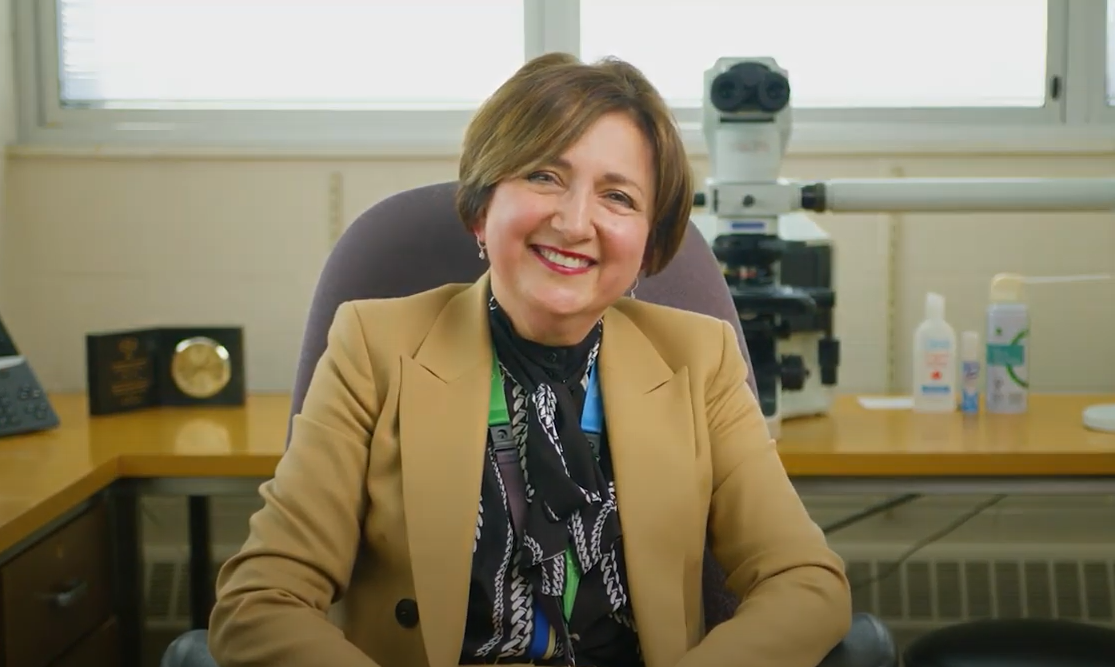During diagnosis, laboratory technicians and pathologists review blood, bodily fluid and tissue samples taken during cancer screening and detection. It is the skilled expertise of our pathology team that confirms the disease, its type and stage.
Many years ago, oncologists relied on the laboratory to determine whether cancer was simply present. Today, pathologists work hand in hand with the oncology team to indicate the exact type of cancer and provide detailed information on the best treatment plan for each patient.
Laboratory tests are also used to evaluate whether cancer is responding to treatment, if a patient has a cancer recurrence or whether a new cancer has developed.
Thanks to support through Our Cancer Campaign, our world-class laboratory and pathology department will continue to be at the forefront of cancer diagnosis and personalized medicine. Read on to learn how we’re leading the way!
At the Forefront of Technology and Research
Lakeridge Health is the first community Hospital in Canada to open a certified biobank allowing our laboratory, research program, and cancer centre teams to store human tissue that can be used to test new drugs and therapies in cancer care.
Unique to Lakeridge Health and not found in any Greater Toronto Hospital, our laboratory uses Tissue Microarrays that compare up to 500 patient samples for analysis at the same time. This allows pathologists and researchers to see how cancer cells from different parts of a tumour or different patients with the same cancer react to treatments at the same time under the same protocols.
Decreasing Wait Times for Cancer Diagnosis with Digital Pathology
Surpassing the Campaign goal is allowing our Foundation to take on yet another innovative priority – the amplification of digital pathology that will drastically decrease wait times for cancer diagnosis.
Cancer diagnosis will soon be one click away. With the digital pathology, pathologists can review cancer cells rapidly and from anywhere. Images from multiple lab sites can be uploaded, assessed and shared with partners faster than ever before, eliminating the need for physical transportation and ensuring the right experts weigh in for every patient.
The need for pathology is higher than ever and complex cancer cases are on the rise. Artificial intelligence technology will also be introduced to support pathologists reviewing tissue samples, improving workflow and speeding up reporting time.
This is just one example of how donor support is helping advance cancer care in all aspects of the patient journey and how exceptional cancer care can and should be available close to home.
Stopping Cancer Before it Happens
Approximately five to ten per cent of cancers are caused by an inherited genetic mutation that may predispose a person to developing cancer. The Genetics Clinic at Lakeridge Health Oshawa evaluates individuals who have a family history of cancer. The clinic relies on laboratory staff to manually review a person’s genetic markers using digital microscopes and special software.
$569,000
“When examining a tissue sample for signs of cancer, we know how much of an impact our findings will have. It’s something we take seriously because we know how grave the result can be. Every sample that comes to our lab is connected to not just a person but an entire circle of family and friends.”
— Dr. Nadia Ismiil, Chief and Medical Director, Laboratory Medicine Program

200
Cancer patients require blood work every day
38,000
Tissue samples diagnosed annually
130
Labratory staff
First Hospital in Canada to introduce a fully integrated digital pathology system
First Community Hospital in Canada to have a certified Biobank

“They helped me make important decisions to stop impending cancer in its tracks and ensure I’ll be here for my sons.”
CARRIE, CONFIRMED TO CARRY ONE OF THE HEREDITARY MUTATIONS LINKED TO BREAST AND OVARIAN CANCER